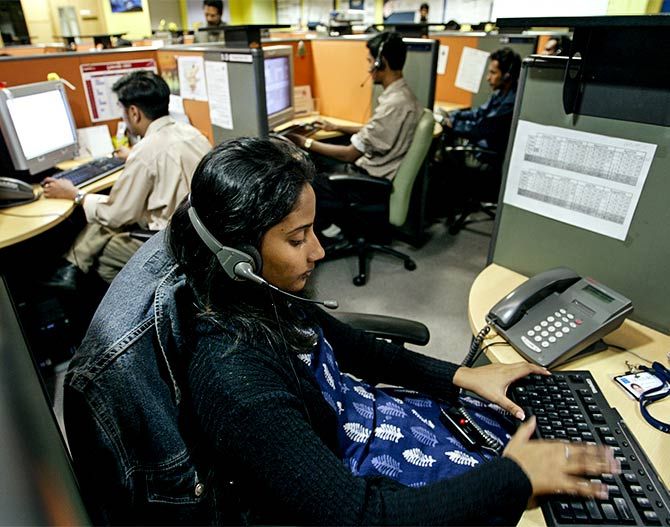In the wake of the unfortunate murder of a techie in Pune by a security guard, Sonal Arora, vice president, Team Lease Services, offers prudent advice to working women.

Photograph: Sherwin Crasto/Reuters
It is a sad reality that India is ranked second last in the Group of 20 (the countries included in the G20 are Argentina, Australia, Brazil, Canada, China, France, Germany, India, Indonesia, Italy, Japan, Republic of Korea, Mexico, Russia, Saudi Arabia, South Africa, Turkey, the United Kingdom, the United States and the European Union) economies in terms of the participation of women in the workforce.
We are just ahead of Saudi Arabia, a country that does not even allow its women to drive.
The overall participation of women in India's workforce, especially within the formal sector, remains a low 27 per cent compared to the global average of 50 per cent.
While there are complex cultural, sociological and even economic factors at play behind these statistics, women's safety itself is a primary area of concern across the country; what varies is the severity.
There is much that can and needs to be done by us, as a society and a country, in terms of changing the overall ecosystem so that more women can participate in the workforce.
At the same time, as women, we need to do our bit to ensure a safer environment for ourselves both at the work place and outside of it.
Here are some safety tips every woman should keep in mind:
Be aware of your surroundings at work and en route to work, especially when you are travelling alone.
Keep a family member, friend or colleague informed of your whereabouts.
The more you pay attention, the less likely you are to be surprised.
Be confident and informed of your rights
In any potentially unsafe situation -- physical or otherwise -- your ability to fight back depends as much on your mental strength as anything else.
It is important to understand that you can and should defend yourself physically should the need arise.
Be informed of your rights; there are several legislations -- like Prevention of Sexual Harassment of Women and Right to Privacy that require employers and society at large to provide the necessary work environment and grievance redressal mechanism for women.
It is also legal for a woman to carry and use pepper spray when in any kind of danger.
Trust your instincts and step up to the occasion.
Take your time before you trust people in your professional space
While the idea is not to be overtly suspicious or distrustful of people, it's advisable to exercise caution for your own safety.
Setting appropriate boundaries with work colleagues and enforcing them is a part of it.
Say NO when you have to, and be assertive.
Watch your use of social media
Be careful of the friend requests you accept and how much you reveal about yourself on social media in terms of your personal details, daily routine, etc.
Remember: The more information you reveal about yourself online, the more vulnerable you are.
Safety first
If your work requires you to travel out of station alone or travel late nights, exercise extra caution.
Take support from your employer in terms of safe transportation, boarding and other facilities that can help ensure your safety.
Sign up for a self-defence class
If you travel alone late at night, or live alone and travel at odd hours for work, basic training in self-defence is highly recommended.
***
Dear readers, how can women ensure safety at work?
According to you, what can organisations do to make workplaces safer for female employees?
E-mail your experiences, tips and suggestions to getahead@rediff.co.in (subject: Workplace Safety Tips) along with your NAME, AGE and LOCATION, if possible. We'll publish the best responses right here on Rediff.com.
*Lead image published for representational purposes only.











 © 2025
© 2025